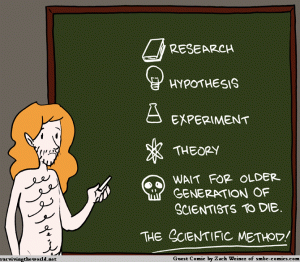Doubt
Doubt is often given a negative connotation. Doubting ourselves or our abilities can hinder the potential of what we are capable of doing. But doubt is also important, if not pivotal, in learning more about our world and in seeking new ideas in science. Without doubt, we would never challenge that which is established in order to discover new possibilities. Doubt is the keystone of progress in science and it is also the antithesis of faith.
The Earth revolves around the sun. This hasn’t always been the case. At one time, the sun revolved around the Earth. Our planet was the center of the universe. Religious texts from many different faiths talked about how the Earth was supported by pillars and suggested the world was flat. But as people doubted these axioms and studied the Earth and our moon and their curvatures, the world slowly began to accept that the Earth was not flat, and that it revolved around the sun.
In the same way, it was once thought our world was made up of small discrete units that could not be subdivided. These were thought to be solid, tiny particles which made up every substance we could see or touch. Overtime we developed better tools and means to study our world and discovered that these building blocks we named atoms are composed of protons, neutrons and electrons and that the number of these components determined the atom’s properties. Once thought to the the absolute smallest building blocks, new tools such as particle accelerators let scientists study quarks and gluons, which make up individual protons and neutrons.
Scientific discovery involves doubt. It also involves experiments with reproducible results. When scientists doubt a particular concept, they can rerun the experiment to reproduce the results. Much of early undergraduate work in fields of Math and Physics involves poofs to show that basic axioms should not be accepted without understanding why they are so.
Even within scientific communities, there can be resistance to change. When people have faith in what they’ve learned and know and are unwilling to doubt, they place barriers in their own learning to new knowledge. On more than one occasion, I’ve heard people talk about how we’re waiting for, “The previous generation of scientists to die,” expressing frustration with those unwilling to embrace new ideas.
We obviously can’t doubt everything or else we’d have no framework from which to build society. But belief and doubt must be tempered with objectivity. People who have built a life based around a flawed understanding of the world, either scientifically or religiously, may feel hesitant to doubt their believes or study opposing viewpoints because a better understanding of that reality may undermine a lifetime of work.
“…I’ve got a lot invested in this ride, shut him up! Look at my furrows of worry, look at my big bank account, and my family. This has to be real…” -Bill Hicks (Comedian)
Feeling that we have too much invested in something is not a valid excuse to close out alternative ideas. New discoveries will last long beyond our limited lifespan. We often borrow from the past and lose sight of the discovery of the now.
The antithesis to doubt is faith. You can doubt a scientific principal and look to experts in that field who preform experiments that show if that principal is verifiable and reproducible. Or if you are a scientist in that field, you may be able to recreate that experiment yourself. We constantly stretch out the tendrils of our understanding to attempt to ascertain what is and isn’t true. But when someone says, “This is my faith and this is my god,” there is nothing one can say. The only challenge to religious faith is doubt, something that is often unacceptable. To ask why it is unacceptable is to be given the response that there is no way we can understand the divinity. So the cycle of faith either continues, or justification is added in the way of unverifiable or unreproducible pseudoscience.
Although one cannot doubt everything and function in society, doubt is essential to continued personal growth, the growth of science and the growth and understanding of society as a whole. It is doubt which led some people to challenge the notion that one human was inferior to another based solely on the color of one’s skin. It is doubt that caused those who observe the sky to question if the sun truly revolved around the Earth. It is doubt in those who said, “We can’t” or “It’s impossible” for us to rise above those challenges and take people to the moon. The balance of doubt and faith is what helps our society embrace progressiveness; that is to rather search for the truth, even if it means that we are wrong, rather than to hold fast to our preconceived ideas in and effort to prove that we are right.

